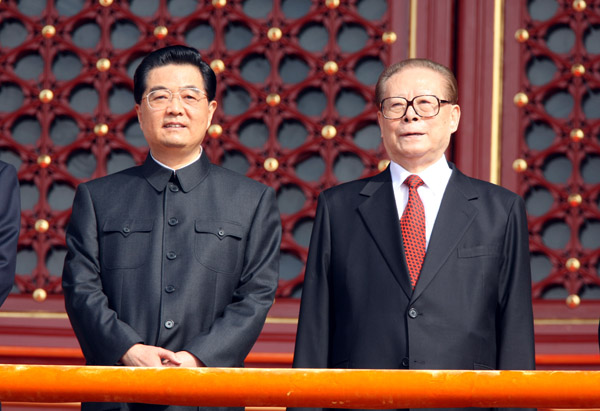Mao suit continued choice of China's top leaders for National Day ceremony
Chinese President Hu Jintao on a sunny Thursday morning made his first appearance in a high-collared dark Mao suit at a grand national ceremony, following the dress code which has prevailed when Chinese leaders review National Day military parades.
|
|
|
Hu Jintao (L), general secretary of the Central Committee of the Communist Party of China, Chinese president and chairman of the Central Military Commission, and Chinese former President Jiang Zemin (R) watch a parade for celebration of the 60th anniversary of the founding of the People's Republic of China, in central Beijing, capital of China, Oct. 1, 2009. (Xinhua/Yao Dawei) |
Former President Jiang Zemin and Hu's top colleagues, the eight members of the Standing Committee of the Political Bureau of the Communist Party of China (CPC) Central Committee, all dressed in Western-style suits with bright-colored ties and some, including Vice President Xi Jinping, wearing red label pins showing the figure 60.
Shortly after, Hu, riding in an open-top, domestically-made, 12-cylinder-engined Red Flag limousine with a license plate showing the year of 2009, shouted "Greetings, comrades," in his review of the troops and equipment along Chang'an Avenue as the commander-in-chief of the People's Republic of China (PRC) armed forces.
Cheers and greetings burst out when spectators saw Hu appear at the balcony of the Tian'anmen Rostrum.
Less than half a year ago, President Hu donned a dark Western-style suit with a blue-striped tie when he reviewed an international fleet on April 23 in waters off the northern seaport of Qingdao to mark the 60th founding anniversary of the People's Liberation Army Navy.
The Mao suit, a combination of Chinese aesthetic tastes and formality which was named after late Chairman Mao Zedong (1893 - 1976), was created by the nationalist revolutionary Sun Yat-sen (1866 - 1925), who ended nearly 2000 years of feudalism in China.
Mao wore this type of suit, with four exposed front pockets, in the PRC inaugural parade six decades ago as well as at all state ceremonies and significant diplomatic occasions during his reign.
Another late top leader Deng Xiaoping (1904 - 1997), who initiated the reform and opening-up in the late 1970s, resumed the dress code when he reviewed the military parade and mass pageant on the National Day in 1984.
Former President Jiang also showed up in the Mao suit ten years ago when the PRC celebrated the 50th anniversary of its founding.
A giant portrait of Mao has been hung on the front of the Tian'anmen Rostrum for 60 years. On the 60th National Day celebrations, a colossal portrait of Sun was erected in Tian'anmen Square, giving Sun eye contact with Mao, who once met Sun in 1924.
Sun's widow, Soong Ching Ling (1893 - 1981) was titled the only honorary president of the PRC.
 0
0 








Comments